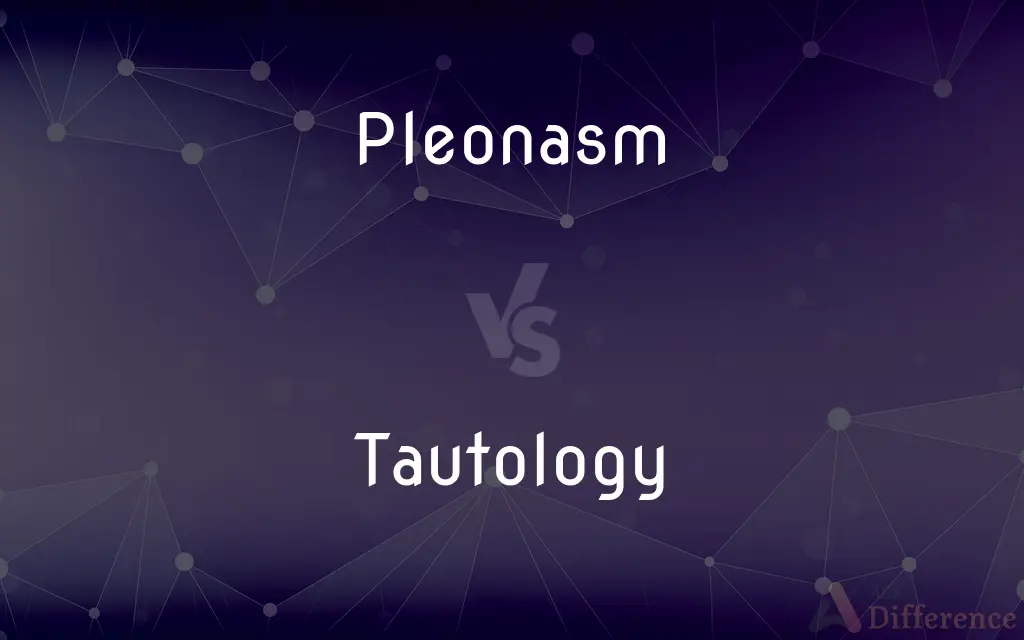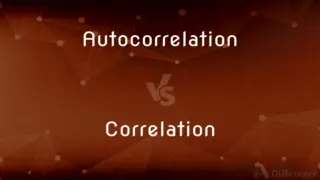Pleonasm vs. Tautology — What's the Difference?
By Urooj Arif & Fiza Rafique — Updated on April 25, 2024
Pleonasm involves using redundant words for emphasis or style, whereas tautology refers to a redundant expression where different words convey the same meaning.

Difference Between Pleonasm and Tautology
Table of Contents
ADVERTISEMENT
Key Differences
Pleonasm is a stylistic device used to enhance or emphasize meaning through redundancy, such as "free gift" where "free" is unnecessary but adds emphasis. On the other hand, tautology is a logical redundancy where phrases or expressions unnecessarily repeat the same information, like "advance warning," where "advance" is redundant.
While pleonasm can be deliberate for effect, often seen in literary or spoken contexts to emphasize or clarify, tautology often occurs in arguments or informal speech, usually considered a flaw because it does not provide additional information or clarity.
Examples of pleonasm include phrases like "true facts," where "true" reinforces the authenticity of "facts." Conversely, tautology involves expressions like "12 noon" or "added bonus," where the qualifiers "12" and "added" are inherently implied by "noon" and "bonus," respectively.
Pleonasm can be effective in persuasive writing or speeches to make a point more memorable or stronger. Whereas tautology, typically seen as a logical or rhetorical error, can weaken arguments by appearing redundant or unnecessarily repetitive.
Both pleonasm and tautology involve repetition, but the intent and impact in communication differ: pleonasm enhances emotional or stylistic expression, while tautology is generally viewed negatively as it suggests poor communication skills or oversight.
ADVERTISEMENT
Comparison Chart
Definition
Use of redundant words for emphasis or style.
Redundant expression implying the same thing twice.
Intent
Often intentional for effect.
Often unintentional and considered a flaw.
Common in
Literary and spoken language.
Informal speech and logical arguments.
Examples
"True facts," "free gift."
"12 noon," "advance warning."
Communication Impact
Can enhance clarity or emphasis.
Generally reduces the effectiveness of communication.
Compare with Definitions
Pleonasm
Stylistic tool to enhance expression.
The flames of the fire burned brightly.
Tautology
Unnecessary repetition of meaning using different words.
They arrived one after the other in succession.
Pleonasm
Excessive wordiness in speech or writing.
At this point in time, we need to decide.
Tautology
Redundant phrase that adds no information.
Each individual person.
Pleonasm
The use of more words than necessary to convey meaning.
He saw it with his own eyes.
Tautology
Use of two terms to express the same thing.
I saw it with my own eyes.
Pleonasm
Redundant language used for emphasis.
She repeated it again.
Tautology
Logical redundancy in phrases.
The sum total of all parts.
Pleonasm
Deliberate use of superfluous words.
I heard it with my own ears.
Tautology
Expression that is needlessly repetitious.
Free gift.
Pleonasm
Pleonasm (; from Ancient Greek πλεονασμός, pleonasmós, from πλέον, pleon 'to be in excess') is redundancy in linguistic expression, such as "black darkness" or "burning fire". It is a manifestation of tautology by traditional rhetorical criteria, and might be considered a fault of style.
Tautology
The saying of the same thing twice over in different words, generally considered to be a fault of style (e.g. they arrived one after the other in succession).
Pleonasm
The use of more words than are required to express an idea; redundancy.
Tautology
Needless repetition of the same sense in different words; redundancy.
Pleonasm
An instance of pleonasm.
Tautology
An instance of such repetition.
Pleonasm
A superfluous word or phrase.
Tautology
(Logic) A statement composed of simpler statements in such a way that it is logically true whether the simpler statements are factually true or false; for example, the statement Either it will rain tomorrow or it will not rain tomorrow.
Pleonasm
Redundancy in wording.
Tautology
(uncountable) Redundant use of words, a pleonasm, an unnecessary and tedious repetition.
It is tautology to say, "Forward Planning".
Pleonasm
(countable) A phrase involving pleonasm; a phrase containing one or more words which are redundant because their meaning is expressed elsewhere in the phrase.
Tautology
(countable) An expression that features tautology.
The expression "raze to the ground" is a tautology, since the word "raze" includes the notion "to the ground".
Pleonasm
Redundancy of language in speaking or writing; the use of more words than are necessary to express the idea; as, I saw it with my own eyes.
Tautology
A statement that is true for all truth values of its propositional variables.
Pleonasm
Using more words than necessary;
A tiny little child
Tautology
A statement that is true for all truth values of its Boolean atoms.
Tautology
A repetition of the same meaning in different words; needless repetition of an idea in different words or phrases; a representation of anything as the cause, condition, or consequence of itself, as in the following lines: -The dawn is overcast, the morning lowers,And heavily in clouds brings on the day. Addison.
Tautology
(logic) a statement that is necessarily true;
The statement `he is brave or he is not brave' is a tautology
Tautology
Useless repetition;
To say that something is `adequate enough' is a tautology
Common Curiosities
What is the main difference between pleonasm and tautology?
Pleonasm uses redundancy for emphasis or style, while tautology involves unnecessary repetition that conveys no additional meaning.
Can pleonasm be effective in communication?
Yes, pleonasm can effectively emphasize or clarify points in both writing and speech.
Why is tautology often viewed negatively?
Tautology is seen negatively as it typically indicates poor communication skills and adds no value to the expression.
How can one avoid using tautologies?
Awareness and careful editing can help avoid tautologies by ensuring expressions add meaningful information.
How does pleonasm impact literary works?
In literature, pleonasm can add depth, reinforce themes, or help characterize speech.
Can tautology be corrected easily?
Yes, by removing redundant elements or rephrasing, tautological expressions can be corrected.
Is pleonasm always intentional?
While often intentional for effect, pleonasm can also occur unintentionally, especially in informal contexts.
What are examples of tautology in everyday language?
Phrases like "true fact" and "12 noon" are common examples of tautology in daily use.
What are some professional contexts where avoiding tautology is crucial?
In academic, legal, and professional writing, avoiding tautology is crucial for clarity and precision.
Are there contexts where tautology is acceptable?
In casual speech or for comedic effect, tautology might be acceptable or even intentional.
Why might an author choose to use pleonasm in a narrative?
Authors might use pleonasm to emphasize a point, set a tone, or reflect a character's speech pattern.
Does pleonasm have a positive or negative connotation?
Pleonasm can have a positive connotation when used effectively for emphasis or style, though it can be viewed negatively if perceived as overly verbose.
Is there a rule for when to use pleonasm?
Use pleonasm when it enhances communication, particularly in persuasive or descriptive contexts, but avoid it when clarity is paramount.
How can pleonasm affect a listener's or reader's perception?
Depending on its use, pleonasm can make communication more memorable and emphatic or, conversely, verbose and cumbersome.
Can tautology be used for emphasis like pleonasm?
While tautology might seem to emphasize, it is typically ineffective because it merely repeats without enhancing understanding.
Share Your Discovery

Previous Comparison
Autocorrelation vs. Correlation
Next Comparison
Duke vs. JukeAuthor Spotlight
Written by
Urooj ArifUrooj is a skilled content writer at Ask Difference, known for her exceptional ability to simplify complex topics into engaging and informative content. With a passion for research and a flair for clear, concise writing, she consistently delivers articles that resonate with our diverse audience.
Co-written by
Fiza RafiqueFiza Rafique is a skilled content writer at AskDifference.com, where she meticulously refines and enhances written pieces. Drawing from her vast editorial expertise, Fiza ensures clarity, accuracy, and precision in every article. Passionate about language, she continually seeks to elevate the quality of content for readers worldwide.














































